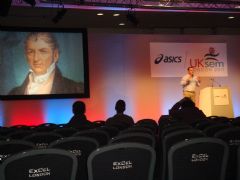Barry presented some of his work conducted with the altitude training programme. He discusses the topic on his blog page, bwfudge.tumblr.com as well as sharing his presentation slides. Click here to see the PDF of Barry's Powerpoint:
By the time Saturday arrived, it appears most people had seen enough & the numbers were remarkably low. As you expect with these conferences, the programme was a mixed bag, with Nick Clark & Vern Gambetta (click on the names to download my notes from their lectures) speaking with the authority & class that I've come to expect from those guys, in contrast to some rather more disappointing offerings by less experienced clinicians.
The presentation that probably made most impact was that by John Neal, a director of the Sport Business Initiative at the Ashridge Business School. John has worked in business & elite sport for the last 15 years, working as a consultant psychologist with several elite sporting organisations. To be honest, I was initially not too impressed with his message of "sport is more than just winning" & I was thinking "here we go again, it's all about the taking part", whilst readying myself for a rant of frustration about the lack of competitive edge in our athletes given the shift away from competitive sports in schools over recent years.
John did, however, start to explain his reasoning & given the recent episodes of indiscipline & arrogance reported so readily in relation to the English Rugby team's behaviour at the recent IRB World Cup (read Oliver Slot's article entitled "In the Drink", published in the Times on 24th November & any of the leaked reports of the RFU debrief to get some insight), there is credence to his argument that with a focus purely on winning, the sporting development of an athlete omits the development of character, resulting in athletes or players that are unable to perform under pressure & displaying an emphasis on self, rather than team. John is currently working with Harlequins, the Aviva Premiership's leading team to date this season & has been instrumental in changing their academy recruitment policy to focus on selecting young players according to their character as opposed to purely on skill & technical ability. This policy is claimed to have seen a 70% progression rate of academy players through to the senior team, as opposed to the average 5% experienced by the other clubs in the league.
In the same vein of thought, when it comes to thinking about the class acts that perform consistently, week after week, year after year even when the pressure is on, it's no surprise that these people are found to be selfless characters who would run through walls for their team, whilst being totally reliable, capable of putting people at ease & bringing out the best in all those around them.
It is these people that become legends & tragically today, one such man, the Wales manager Gary Speed passed away at the age of just 42. I never had the privilege of meeting or working with Gary but the manner in which he conducted himself in the public eye was a lesson to all budding sports professionals & I have yet to hear a bad word said about a man who clearly had a very successful career in football management ahead of him. The sporting world has lost a shining light.
All in all, John's was a very interesting lecture & he is someone I have promised to get in touch with over the coming weeks.
Overall, I would say that I saw very little that would change my practice but it was good to catch up with several of the speakers & attendees, despite the fact that it would have been good to see more faces. If anyone else was at UKSEM & would like to share their opinions on the event, please comment in the box below.

